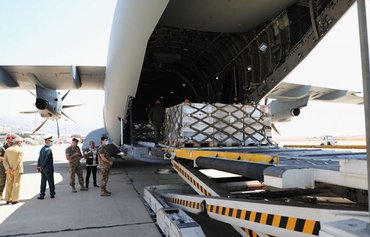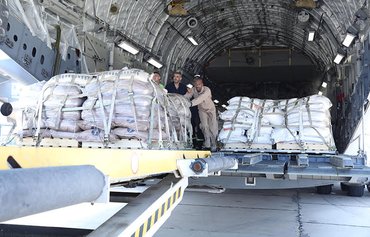BEIRUT -- A decision by the United States to authorise additional assistance for the Lebanese Armed Forces affirms its role in maintaining stability, refuting rumours it has surrendered Lebanon to the Iranian axis.
US President Joe Biden on Tuesday (September 7) signed an executive order authorising US Secretary of State Antony Blinken to grant up to $47 million in immediate assistance to the Lebanese Armed Forces.
This enables him to draw "up to $25 million in commodities and services from the inventory and resources of any agency of the US government to provide immediate assistance to the Lebanese Armed Forces", the order said.
It also authorises him "to direct the drawdown of up to $22 million in defence articles and services from the Department of Defence to provide immediate assistance to the Lebanese Armed Forces".
So far this year, the United States has provided $120 million in support of the Lebanese army's operation and capabilities, and an additional $59 million in compensation for the expenses incurred by the army in 2018.
The new move comes as Lebanese soldiers face unprecedented pressure as they work to maintain security and stability amid an economic crisis.
Hardships include the elimination of meat from troops' diet last year to save money.
It affirms the Unites States' decades-long and ongoing commitment to the Lebanese army, a source in the Armed Forces Command said.
"This initiative supports the US's bet on the army's need to stand steadfast, be fully prepared, and take exceptional steps to maintain stability," he said.
Lebanese Armed Forces commander Gen. Joseph Aoun has been travelling abroad and meeting with military leaders and heads of state, among others, in a bid to shore up support for the country's armed forces, the source said.
"The command's top priority is to strengthen its soldiers economically and financially to help them carry out their national duties," the source said.
Biden's authorisation "reflects the US interest in Lebanon with regard to the military establishment and the Lebanese people who are suffering from the economic and financial crisis", said political analyst Elias al-Zoghbi.
Support for Lebanese army, people
The US authorisation is "an indication of the administration's continued pledge to support the army and its key role in maintaining national stability", said Regional Forum for Studies and Consultations director Brig. Gen. Khalid Hamada.
The United States recognises "the need to preserve the military institution as one of the key factors that will help Lebanon come out of its crisis", he said.
The military aid comes as energy ministers from Egypt, Jordan, Syria and Lebanon on Wednesday agreed on a plan to bring natural gas and electricity to crisis-hit Lebanon at a meeting in Amman, AFP reported.
Egypt expressed its readiness to transfer gas to Lebanon as soon as possible via the transnational Arab Gas Pipeline, but damage to the pipeline and to electricity lines in Syria means repairs are needed before energy supplies can start flowing.
In the push to help revive the Lebanese economy, the United States has given rare approval for Syria's neighbours to escape punishment under sanctions targeting the regime of Bashar al-Assad.
This was a decision "that did not happen by chance or as a reaction to the Iranian oil tanker [scheme], but was being discussed for months", Hamada said.
Hizbullah chief Hassan Nasrallah on August 22 announced that the first of several vessels carrying Iranian oil was on its way to Lebanon -- a sanctions-defying move that critics said could cost Lebanon dearly.
His announcement evoked a furious reaction from Lebanese politicians, and accusations that Nasrallah was trying to paint himself as a "saviour" amid Lebanon's energy crisis, to the country's detriment.
"The US administration is trying to stop the collapse in Lebanon by solving the energy issue, which has caused problems mainly in the health and educational sectors, transportation and daily life services," Hamada said.
Pushing back on Iranian influence
Biden's authorisation "refutes all the narratives that claimed that the US had decided to surrender Lebanon to Iran or to leave the Lebanese cause and Lebanon's future in the Islamic Republic of Iran's hands", he noted.
With recent initiatives, Hamada said, the United States has in fact "given multiple indications that Lebanon will not become an Iranian area of influence".
Elsewhere in the region, countries have been pushing back on Iranian influence.
Hamada pointed to the August 28 regional summit in Iraq, which observers saw as a sign that Iraq wants to take back control of its trajectory. Iraq has faced tensions and conflict as a result of Iranian influence and meddling.
Supporting the Lebanese Armed Forces and facilitating the flow of energy to Lebanon via its Arab neighbours will help Lebanon "go back to being part of the Arab inter-connection networks, economically and energy-wise", he said.
This will gradually take Lebanon out of the Iranian sphere, he said, and will thwart the efforts of those countries who seek settlements with Iran and Hizbullah at the expense of Lebanese sovereignty.

![Lebanese Armed Forces commander Gen. Joseph Aoun arrives at a handover ceremony to receive four A-29 Super Tucano aircraft given by the United States at Hamat air base, north of Beirut, on June 12, 2018. [Joseph Eid/AFP]](/cnmi_am/images/2021/09/09/31600-Lebanese-army-commander-600_384.jpg)






